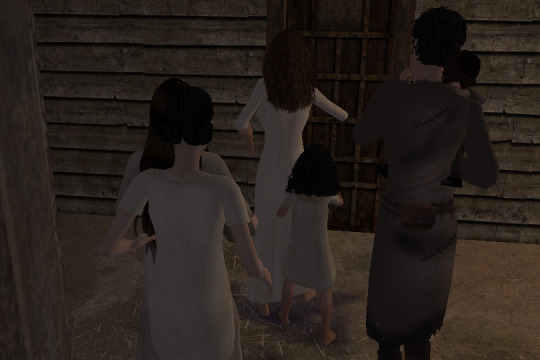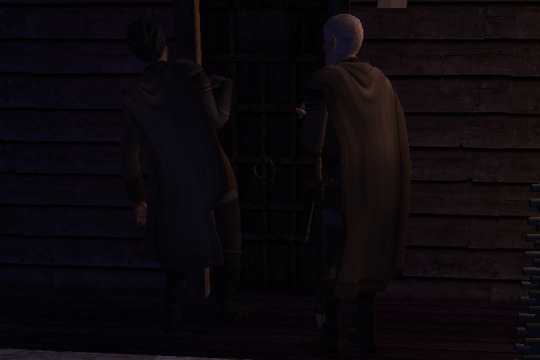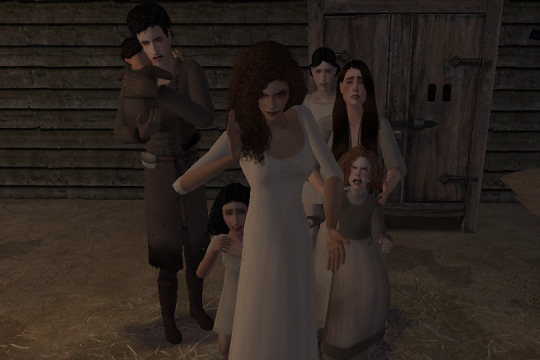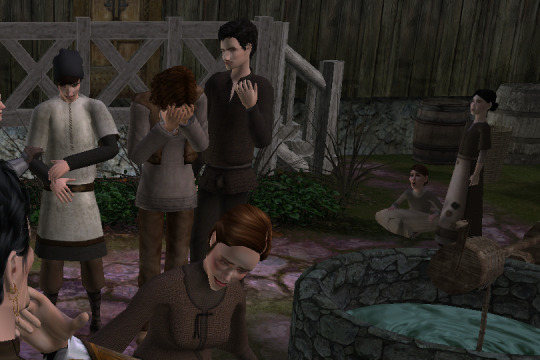#serfs
Text

Serfs react to Opabinia
#the best boy#also most confusing#mideval#serfs#me when I was 5#love them weirdos#Opabinia#cambrian explosion#bug posting#i guess#paleontology#archeology#old english#shitpost
481 notes
·
View notes
Text

*bangs against the door*

"Yoo hoo little serfs, open up open up! Is anyone home? Open quickly or there'll be trouble!"

Simstober 2023 Challenge - Day 22- Bar the Door
Never open the door to anyone who knocks after nightfall
26 notes
·
View notes
Text
Songs are funny things
I'm not very dumb, but not very smart either. And I'm old and I work. So there's whole bunches of stuff that's important that I'm pretty ignorant about. I am glad to be curious. As ignorant as I am, I often fall into rabbit holes.
I was thinking about songs. I want people to sing songs. There's a quote by Pete Seeger about songs which I like very much:
“Songs are funny things. They can slip across borders. Proliferate in prisons. Penetrate hard shells. I always believed that the right song at the right moment could change history.”
I was mulling over the trouble with people singing other people's songs. And thought of a lecture that Lawrence Lessig gave a long time ago. Searching for it the very first google result was a link to Leonard Lin's blog random($foo). Lin had put the lecture on the Internet and it's kind of cool to see how it was done back then. I headed over to YouTube to watch Lessig's talk at the O.Reilly Open Source Conference in July of 2002.
The talk is still worthwhile. At the time some of my creative friends thought Lessig was a sort of villain, so his talks got talked about.
At Tumblr someone I am very pleased to have encountered is Dr. Damien P. Williams. Something about meeting him at first on here is knowing what a kind and good person he is prior to discovering his deep erudition about the social implications of technology. These days I follow him on Mastodon where he pointed to an episode of NPR'S Code Switch with Safiya Noble dealing with "the complex questions that arise when algorithms and AI intersect with race."
It's a wonderful interview which really does touch on complexities, but the part that really made an impression was her background in advertising before returning to graduate school and earning her Ph.D. It put the economics of enclosure front and center in discussing AI.
I'm describing my fall down a rabbit hole and I think the next thing I engaged with was a post by Andy Baio at WAXY, Weird A.I. Yankovic, a cursed deep dive into the world of voice cloning. Songs are funny things.
After that I landed on a review of a new book by Yanis Varoufakis by Christopher Pollard at The Conversation, Is capitalism dead? Yanis Varoufakis thinks it is – and he knows who killed it. The book is entitled Techno-feudalism: What Killed Capitalism and will be available in print in the US in February. I listened to several interviews with Varoufakis and searched for literature on Neo-feudalism. It's certainly an idea I want to learn more about.
Back in the early oughts there was a book, Netocracy : the new power elite and life after capitalism by Alexander Bard & Jan Söderqvist. For a little while the ideas were discussed quite a lot online. Remembering those conversations I did not anticipate how incredibly concentrated the autocracy would become, i.e., how few feudal lords there would be. And I paid too little attention to Chinese technology. But Bard coined a term for a new underclass called the "consumtariat" which seems quite handy and has stuck with me over the years.
It's going to take me a long while to wrap my head around neo-feudalism. But I suspect it will be time well spent.
Wendy Grossman at net.wars has a recent post, The end of ownership. The provocation for the post is a garage door opener which among other evils forces an ad on you before you can open the garage door. Grossman points to Cory Doctorow, The enshittification of garage-door openers reveals a vast and deadly rot. I'd laugh, but it telling how fast technology and the tech-lords are enclosing us.
Who can sing songs and whose songs can we sing are urgent questions.
6 notes
·
View notes
Text

Seignobos, Charles, 1854-1942, and Earle Wilbur Dow. The Feudal Régime.New York: H. Holt and company, 19041902.
2 notes
·
View notes
Text
The life of the medieval peasant was a life of long working hours, one-room houses, living with livestock, and hoping, mostly in vain, that the landlord was a good person!
35 notes
·
View notes
Video
Ep 202: All Access: Middle Ages: The Fabulous Life of Serfs
I wish theyed make more stuff like this tbh. This was made back in 2006. And comedy central weirdly has tried to hide it as best they can.
11 notes
·
View notes
Text

Страна едва видна в багровом мареве.
Закрыты двери в матушку Европу.
Но всё равно народ стоит за барина,
Гордятся своим барином холопы.
И смотрит с изумлением Немцов,
Но, к сожалению, не находит больше слов.
И с каждым днём ему всё больше жаль,
Что жизнь отдал он за такую шваль.
#####################
The country is barely visible in the crimson haze thanks to the bastard.
Mother Europe closed all the doors.
But nevertheless the people stand for their master.
Not much can be done when folks born to be serfs.
And looks with amazement Nemtsov,
But, unfortunately, does not find new words.
And every day he regrets more and more
That he lost his life for the soldiers of Kremlin warlords.
#книга#поэзия#стихи#литература#poetry#песня#искусство#русский блог#poem#russia#россия#украина#ukraine#nemtsov#немцов#война#war#холопы#история#serfs#history
9 notes
·
View notes
Link
I myself am someone who spends a lot of time reading books and articles about the Middle Ages and then using the Internet to talk about that interest of mine. However, this recent article makes some good points about how there are individuals today who look at the era fondly when there is nothing to be fond of. It argues that this happens with people on both sides of the political spectrum. While the reasons are different, according to the author, the mindset can have similar effects, and the reality of living at the time for a common serf involved daily toil, no civil liberties, a high risk of dying young, and a pervasive likelihood of violence. This article is interesting both in its discussion of medieval life as well as how modern society looks at the past.
#article#discussion#europe#health#historians#history#interesting#medieval#middle ages#mindset#nobility#nobles#peasantry#political spectrum#politics#quality of life#serfdom#serfs#society#scholarship
17 notes
·
View notes
Photo

I don’t think it’s funny.
And I’m disgusted that these children think of themselves as activist, insist that they know how to end racism and war and they’re going to change the climate while they’re at it, meanwhile they can’t do a fucking thing about rents on their own goddamn street!
Wait. They can’t do a fucking thing about potholes or the reliability of public transportation, because those things are too hard? Reprogramming human nature, changing the climate is easy but don’t ask them to notice much less care much less work for a solution to problems that they themselves are already living with?
I hate the world.
#Rent#Real estate#The landed gentry#Plebs#serfs#morons#but facebook said#no facts#only truths#screenshot#screen capture
2 notes
·
View notes
Photo

Yet another requisition for the mines
19 notes
·
View notes
Text
God, Tsar, and Land
'Their [the serfs] fundamental grievance was not serfdom itself, but land tenure. Though they were prepared to give service to the state and to provide recruits for its armies, they regarded the land as theirs or as God's, a communal resource to be available to all those who cultivated it and had need of it. When a young nobleman, I.D. Iakushkin, decided to free his serfs around 1820, the peasants rejected his plan because he intended to keep the land as his own property, paying them a wage to cultivate it. "In that case, batiushka, let's leave things as they are: we are yours, but the land in ours." They still wanted his patronage and were prepared to acknowledge subjection to him, but they insisted on their right to the land.'
Russia and the Russians, by Geoffrey Hosking
0 notes
Text
F.A. Hayek Road to Serfdom
A sometimes quoted gospel of the conserative base in America is F. A. Hayek's work Road to Surfdom, usually quoted alongside other problematic works like the Black Book of Communism or Thomas payne's numerous works calling for separation from England. Problematic in the sense of being a highly persuasive text rather than academic. I would point out that Hayek disagrees with many aspects of American politics, especially the parties.
Hayek was born in Austria in 1899 and graduated from the college of Vienna after the First World War. He would later go to London for education in economics. I only point this out that he experienced England at the height of its colonial power, and Europe during a time of great political turmoil. His theories are likewise shaped and molded by the great maddening of the world. Communism itself would become popular in much of the world during this time and perhaps he saw it as a threatening force to the liberties of many of his countrymen.
His work is not a refutation of any government system, but a critique of government power. He believes that any rights enshrined to the people will naturally be surrender to the government in the course of business. That governments inherently require a subjugation of the rights of individuals in order to function.
So my issue with his theory is that he cannot model the behavior of thousands of different groups. His assumptions are invalid because people do not have inherent rights other to think for themselves and to die. All other privileges are social constructs, which is why countries have to keep spelling them out. What he calls the road to serfdom is *check notes* paying taxes? owning property? being able to use a bank? employees washing their hands after using the bathroom?
Hayek's extreme libertarian views undermine the value his work has. Economics theories are both mathematical formulas that explains markets, and legislative suggestions to politicians. I find it wise to ignore the proscription side of economics and focus more on how the math works, its assumptions are more important than its conclusions.
Every person performs complex economic value statements every day with how they spend their time and their money. A wise rule of thumb is that people do not act in their own best interest. Another rule is that when left alone, people tend to maximize happiness in the short term. Applying these two assumptions to government, then we can understand that long term projects must needs be influenced by the countries government. A group of individuals will not build hospitals, roads. factories, etc. if they can get something more useful now. This is one of the many reasons billionaires suck ass. They only act for their own best interest in the short term, like buy twitter, launch cars into space for no reason, build a metaverse that doesn't work, scam bitcoin, scam people looking to lose weight. The list goes on. But the actual important stuff is being done by the government.
What hayek calls the road to surfdom is just how human nature works. It isn't a bad thing. When I read it I thought it was going to be some sort of Ayn Aand kind of thing, and yep, it is basically academic Atlas Shrugged. it doesn't know what it wants to say, and it meanders all over the place. The funny thing is that Hayek had literal servants in London, and wrote a book about the road to servitude. I don't think he asked them about why they serve. Its capitalism at its finest being exercised in a class system. People serve because they want to survive, not because they surrendered rights to the government. Maybe that is what it looks like when examining multiple generations of people, but individuals when put to the sword often choose to live. Serfs existed in Europe and England as landless tenants living off the welfare of the lord, welfare being taxed most of their property every year. As landless individuals they had very little rights, but they weren't slaves. The lord controlled marriages, and often had exclusive rights to claim their children as servants/concubines.
So what did each individual surrender to the government on their own road to surfdom. According to Hayek, specific rights, but in reality, they choose to live instead of being slaughtered, or starved. They had a choice between life and death. This is what Hayek ignores in his book. He uses such a whitewashed version of what serfdom is and British history that the books message is lost. But to be fair it was inpolitic to talk about these kind of things in 1940's Europe, what with what was going on.
0 notes
Text
(in most annoying voice imaginable while participating in a campaign of brutal repression against the serfs of the countryside) uhmmm. yeah… I am DEFINITELY going to hell for this one!
1 note
·
View note
Quote
some drink to forget, some drink to remember, you clearly drink to embarrass yourself
the fucking bouncer @ me at this club???
0 notes
